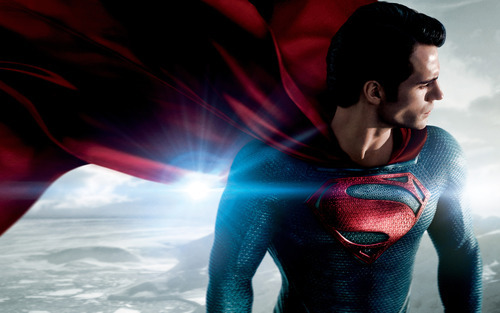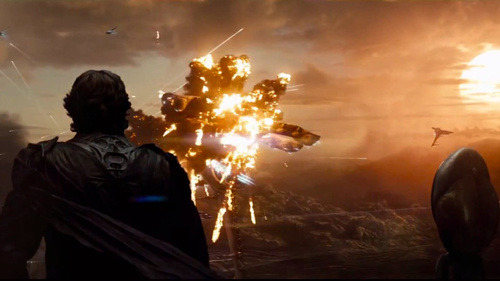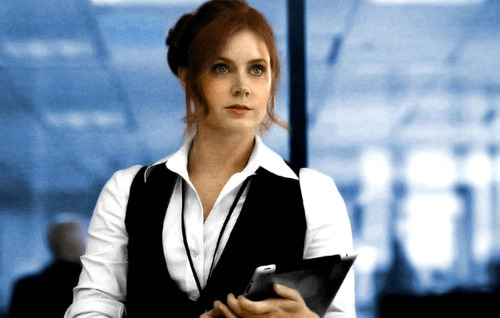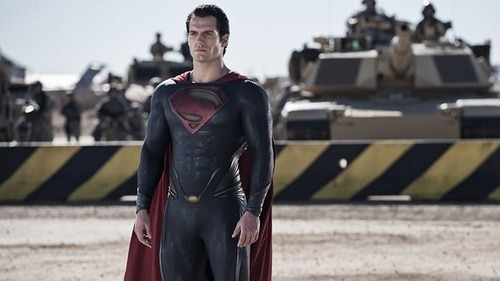MAN OF STEEL (2013)

It’s a bird! It’s a plane! No, it’s just Henry Cavill’s bulging pecs.
At least that’s what Zack Snyder’s Man Candy of Steel seemed like to me when summed up in one line. It’s nice to have a male superhero to simply objectify, and Henry Cavill is surely that in the newest cinematic incarnation of Superman. You don’t need x-ray vision to notice Cavill’s chiseled features or sculpted physique, and yes, I feel like these deserve special mention because they were almost characters themselves amid this special effects extravaganza. I would also like to prove that I am not blind.
So now that’s settled and I’ve drooled enough, let me muster up what little professional composure I have to get to the serious business part of this review. How was Man of Steel?
Well, as mentioned before, it was a graphics extravaganza, which is the least we can expect from director Zack Snyder, whose 300 and Watchmen were certainly feasts for the eyes. Another way of describing it would be that it was an exercise in just how outdated Hollywood could make every prior installment of Superman ever made. Suddenly Marlon Brando’s cloudy hologram appearing in ice seems like a cave drawing compared to Russell Crowe’s ultra high-tech, 3D Jor-El. The improved graphics were really what made this film a treat for audiences. Although the story was a little shaky and the dialogue a little simplistic, it was still an entertaining watch and a nice introduction to Superman.

The reboot starts off on the planet Krypton, home of Superman (AKA Kal-El) and his parents, Jor-El and Lara (played by Russell Crowe and Ayelet Zurer). The film doesn’t waste time with pleasantries, plopping audiences in the middle of a Kryptonian civil war and impending apocalypse. Knowing that their planet is doomed, Jor-El and Lara send their newborn son, Kal-El, on a ship to Earth. The film fast forwards to the present day, with a brooding Clark Kent on a fishing boat. He has been grappling with his place in the world; unsure of whether to consider humans his kin or if he should be searching for answers elsewhere. The film then weaves in flashbacks of Clark growing up in Smallville with Ma and Pa Kent (played by Diane Lane and Kevin Costner). Clark takes odd jobs in an effort to conceal his extraordinary powers. One such job involves being a hired hand at a UFO crash site, where he meets The Daily Planet’s investigative journalist Lois Lane (Amy Adams). The UFO turns out to be the ship that bore Clark from Krypton to Earth, and in it Clark finds some answers. He also draws attention to himself when he is forced to use his powers to save Lois from an injury. Lois then tries to track Clark down, convinced his story needs to be told to the world. When General Zod and the Kryptonians arrive on Earth, they demand that the humans turn over Kal-El. Clark finds himself in a unique position as he struggles over the choice of defending Earth or siding with his own people, the Kryptonians.
The basic premise of the film is solid. Superman is torn between the humans and Kryptonians. He has found both good and bad in humans; good in his parents who raised him, bad in the people who treat him like a freak because of his powers. When the Kryptonians arrive, Clark finally has the opportunity to find out where he comes from and who his people are. Instead he is forced to choose between heritage or duty. There’s a new story to be told here, and I was disappointed that the film didn’t quite fulfill it in a way that was robust or satisfying. The story starts off well, raising important questions and setting up the encompassing themes. Unfortunately, it forgets these thematic elements halfway through and instead turns into a Michael Bay-esque destruction zone of demolished buildings, explosions and collateral damage. Nothing wrong with big action and explosive special effects, especially when they are as well done as they are in Man of Steel. However, for a film that promised an introspective look at Superman, it merely scratched the surface of the character and didn’t provide insight into his frame of mind. I will say, however, that the choice to skip most of the Smallville parts was a wise decision, because we’ve already seen that story told so many times. The way it was told through a series of flashbacks instead of a traditionally linear way was also a good choice.
But one of the best things about Man of Steel is that finally, the technology has advanced to where Superman’s awesome powers can be showcased in all their glory. Heat and x-ray vision, super strength, super speed - you name it, it’s in this movie, and it’s showcased in quite glorious fashion. Watching Superman and the Kryptonians duke it out was like observing gods playing in a sandbox. Earth was theirs to wreak havoc on as they trampled over fields and cities, leaving breathtaking destruction in their wake. The digital effects work from WETA Digital and company was impressive. It was so good, I had a hard time figuring out where the actors ended and the CGI began. There were moments, however, that just seemed like a lot of digital noise. The action was so destructive that at one point it just looked like the screen was filled with explosions. I suppose that’s what one can expect when we watch gods fight each other.
The film’s costume design was also really top-notch. It gave the caped crusader a much-needed update. To quote the great Heidi Klum, in fashion, one day you’re in. The next day you’re out. And Superman sure needed an extreme makeover. Gone are the gaudy red underwear and pastel-colored cape-and-tights combo. The new Superman was clad in a navy blue skinsuit that fit him like a glove, which was an excellent visual cue meant to give the impression that Clark looked and felt more at home in this suit than in any of his farm boy outfits. I also thought there was a painstaking attention to detail in the design of the film. Not only was there an abundance of easter eggs that were nods to previous Superman projects, but there were also small touches to the film that acknowledged other incarnations of Superman. For instance, when Superman is standing one can’t really see the iconic yellow background underneath the ’S’ symbol on his chest. However, when he is lying down in one scene, there is a distinct yellowish gold background that can be seen in the symbol. I thought this kind of subtle homage to the iconic Superman logo was really interesting.

From a performance standpoint, everyone involved did an OK job. Cavill was convincing in the role, even though he doesn’t really have a lot of speaking lines and it seemed like he didn’t have much to work with. It was also a shame that the film was as dry and humorless as it was, because I thought it would have been interesting to see Cavill turn on the Kansas farmboy charm. I personally loved Amy Adams’ more proactive, principled Lois Lane. It takes some serious cajones to defend the anonymity of your sources even when the very fate of the world is hanging in the balance. I loved her uncompromising nature, and how she wasn’t just content sitting by while everyone else was trying to do something. While I felt that the romance between her and Clark could have been a little more established, I thought there was undeniable chemistry between the two leads that was exciting. I just got a real sense that Lois was a strong person and that her character wasn’t going to be reduced to being a sidekick or damsel in distress. I also thought it was great that the film made a big change in the Superman storyline by making both Superman and Clark known to Lois before Clark joins The Daily Planet. I thought this was a much more realistic angle than the eyeroll-worthy one of Lois not recognizing Superman with glasses. I did think, however, that more could have been done to give the secondary characters some substance. Most of them were just sort of…there. Even poor Christopher Meloni was terribly underutilized. Cooper Timberline, who plays a young Clark Kent, was fanfreakintastic though. Laurence Fishburne and Michael Kelly, both tremendous actors, also seemed underutilized. It also needs to be mentioned that this film had some of the worst extras I’ve ever seen in a blockbuster movie. There were reaction shots peppered throughout the film especially during the climactic scenes, and the extras looked like they were just gawking without any sense of context.

The scene-stealers in the film, however, were certainly Michael Shannon and Antje Traue, who played the Kryptonians General Zod and his second-in-command Faora. Michael Shannon is probably one of the most underrated actors out there, and one of the things that makes him amazing is that he always brings a very relatable quality to all of his characters, even when they are abhorrent. General Zod could have been just another typical villain, much like Kevin Spacey’s over-the-top Lex Luthor in Bryan Singer’s disastrous Superman Returns, but instead Shannon gave Zod a human quality that made him sympathetic. I felt sorry for Zod when he launched into the monologue about having no home and no people. It was a poignant part of the film that I thought made him more sympathetic than even Superman. Antje Traue was also phenomenal as the uncompromising Faora. Not only was her steely-gazed and icy character a force to be reckoned with, but she commanded the screen with her presence.
There was one particular scene that I thought was interesting, and that was Clark’s visit to a church, where he asks a priest for advice. I thought this was a nice addition to the story because it was a thought-provoking vision, seeing an alien seeking spiritual advice from a priest. I thought it was rather poetic to have Superman (who is essentially a god) at a church, which is an institution symbolic of humanity’s quest for answers. I didn’t find it preachy at all, like other people did, but I thought the scene implied that there is a similarity between Superman’s search for identity and humanity’s search for where we come from and, to quote Pa Kent, “Are we alone in the universe?” It’s only too bad that there weren’t enough scenes like this because it would have really taken the superhero’s story to another level.
I also thought that the decision to change aspects of Pa Kent’s was interesting and a nice drift away from what we’ve often seen in past versions of the story. In previous versions of Superman, Pa Kent always dies of a heart attack, which serves as a teaching moment for young Clark because he not only learns to understand the importance of human life, but he also realizes that there are things outside of his control - both realizations that inform his decisions as Superman. In Man of Steel, Pa Kent dies via natural disaster: a tornado. While this does change things for Superman, I thought that the event wasn’t without its own lessons. For one, this version of the story seems to revolve around Pa Kent teaching Clark to use his powers for good and not selfish reasons. In his childhood, for instance, Clark often battles with self-restraint. When he is bullied, he struggles to control the urge to fight back with his powers. Even when he grows up, he still has to learn to lock up his temper because he could inflict extreme damage to others. Pa Kent’s moral of the story is not that different from what he’s imparted in other versions of Superman, and he actually sort of borrows his lesson in Man of Steel from Uncle Ben in Spider-Man: “with great power comes great responsibility”. And that’s the moral to Man of Steel. Clark could have chosen to use his powers to help his father, but he would have done it at great risk to himself and his family. Pa Kent wanted Clark to take responsibility for his powers and not to abuse them to benefit himself. A tornado may have been well within Clark’s powers to control and even overcome, but he would have been playing god at that point. Pa Kent’s moral of restraint with the use of his powers is a resonant one, even though the film doesn’t do a very good job of weaving this throughout the whole story.

While Man of Steel is certainly enjoyable, it comes with its own share of flaws. For one, David S. Goyer’s writing is bland, humorless and scatterbrained. Goyer is a hit or miss, as his work in The Dark Knight Trilogy proves. He can be really brilliant, elevating the average caped crusader genre to thought-provoking stuff, like in The Dark Knight. On the other hand, there’s the hot mess of The Dark Knight Rises, which is all show but no substance. Man of Steel is inbetween the two films, more Batman Begins than The Dark Knight or The Dark Knight Rises. Man of Steel is a pretty straightforward introduction to Superman that, while initially promising a more reflective mood, ultimately turned out to be pretty much just a showcase of special effects. There are hints of promise in the film, such as a more proactive Lois Lane as well as the time spent on Krypton, but there was a lack of emotional drive in the film that made the ending a little unsatisfying. I didn’t feel as though the weight of the world was on Superman’s shoulders, on top of his internal struggle of identity. I felt that the ending with Zod would have been much more justified had the film spent more time exploring the dilemma Clark was having with regards to his identity.

Speaking of the controversial ending with Zod, well, I don’t mind it, really. I’m no DC purist, so I really could not care less that Superman broke a code that seems rather silly to begin with. I understand that he’s the boy scout, that he would never hurt a fly, but I think that Superman’s choice in the end made sense, at least in Zack Snyder and David S Goyer’s grand scheme of things. I felt that Superman had taken everything from General Zod, and as his emotional monologue revealed, he had nothing to live for now that his sense of purpose had been taken from him. In a way, Superman was committing an act of mercy, killing Zod instead of zapping him to some remote dimension. I think that all the furor surrounding the ending would have dissipated had there been enough of a build-up in story. Had the audience really felt that Superman absolutely did not want to kill Zod or anyone else, the ending would have felt justified. Instead, amid all the vaporized buildings and trampled civilians, it didn’t really seem as though human life was of that great a value to Superman, let alone an outsider like Zod’s.
Overall, Man of Steel is a solid reboot of the outdated Superman franchise. I wouldn’t go so far as to call it the best Superman movie to date, but it does set up a lot of potential for future sequels. I think the film makes some changes to the characters that make it a lot more interesting and relevant, not to mention the advances in special effects make Superman’s adventures a lot more enthralling to watch. Hopefully a sequel will be a lot more cohesive, better written and challenging than this first installment. Man of Steel is super, for sure, but it’s a little short of sensational.


